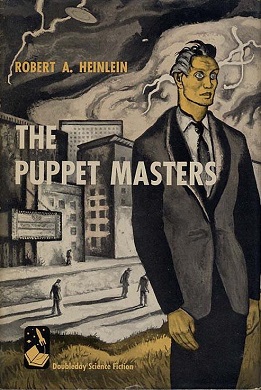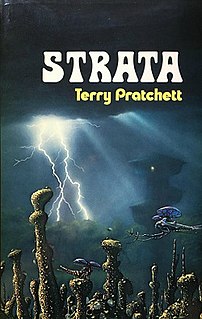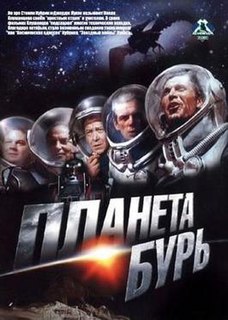
Fictional representations of Mars have been popular for over a century. Interest in Mars has been stimulated by the planet's dramatic red color, by early scientific speculations that its surface conditions might be capable of supporting life, and by the possibility that Mars could be colonized by humans in the future. Almost as popular as stories about Mars are stories about Martians engaging in activity away from their home planet.

The Puppet Masters is a 1951 science fiction novel by American writer Robert A. Heinlein, in which American secret agents battle parasitic invaders from outer space. It was originally serialized in Galaxy Science Fiction.

Between Planets is a juvenile science fiction novel by American writer Robert A. Heinlein, originally serialized in Blue Book magazine in 1951 as "Planets in Combat". It was published in hardcover that year by Scribner's as part of the Heinlein juveniles.
Planets in science fiction are fictional planets that appear in various media of the science fiction genre as story-settings or depicted locations.

Sexual themes are frequently used in science fiction or related genres. Such elements may include depictions of realistic sexual interactions in a science fictional setting, a protagonist with an alternative sexuality, a sexual encounter between a human and a fictional extraterrestrial, or exploration of the varieties of sexual experience that deviate from the conventional.

Strata is a science fiction novel by Terry Pratchett. Published in 1981, it is one of Pratchett's first novels and one of the few purely science fiction novels he wrote, along with The Dark Side of the Sun and The Nome Trilogy.

Out of the Silent Planet is a science fiction novel by the British author C. S. Lewis, published in 1938 by John Lane, The Bodley Head. Five years later it was published in the U.S.. Two sequels were published in 1943 and 1945, completing the so-called Cosmic Trilogy or The Space Trilogy.

Perelandra is the second book in the Space Trilogy of C. S. Lewis, set on the planet of Perelandra, or Venus. It was first published in 1943.

Fictional representations of the planet Venus have existed since the 19th century. Its impenetrable cloud cover gave science fiction writers free rein to speculate on conditions at its surface; all the more so when early observations showed that not only was it very similar in size to Earth, it possessed a substantial atmosphere. Closer to the Sun than Earth, the planet was frequently depicted as warmer, but still habitable by humans. The genre reached its peak between the 1930s and 1950s, at a time when science had revealed some aspects of Venus, but not yet the harsh reality of its surface conditions.

"Upon the Dull Earth" is a science fiction short story by American writer Philip K. Dick, first published in November 1954 in Beyond Fantasy Fiction.

In science fiction and ufology, a Venusian or Venerian is a native inhabitant of the planet Venus. Many science fiction writers have imagined what extraterrestrial life on Venus might be like.

Somnium is a novel written in 1608, in Latin, by Johannes Kepler. The narrative would not be published until 1634 by Kepler's son, Ludwig Kepler. In the narrative, an Icelandic boy and his witch mother learn of an island named Levania from a daemon. Somnium presents a detailed imaginative description of how the Earth might look when viewed from the Moon, and is considered the first serious scientific treatise on lunar astronomy. Carl Sagan and Isaac Asimov have referred to it as one of the first works of science fiction.

The planet Jupiter, the largest planet in the solar system, is a popular backdrop for science fiction stories and films. Early works of science fiction used Jupiter itself as a location for stories, but modern science has shown that the planet has no solid surface one could land on and that its atmosphere, temperature, high gravity and intense radiation is hostile to human life. As a result, the Jovian system as a whole, including both the space around Jupiter and its very extensive system of moons, is a more common setting for science fiction.

Tenbatsu! Angel Rabbie is an anime OVA.

Love and War is an original novel written by Paul Cornell and based on the long-running British science fiction television series Doctor Who. It features the Seventh Doctor, Ace and introduces a new companion, Bernice Summerfield. A prelude to the novel, also penned by Cornell, appeared in Doctor Who Magazine #192.

In the Courts of the Crimson Kings is a 2008 alternate history science fiction novel by American writer S. M. Stirling.

Planeta Bur is a 1962 Sovcolor Soviet science-fiction film scripted by Alexander Kazantsev from his novel, and co-scripted and directed by Pavel Klushantsev.

Dying Earth is a subgenre of science fantasy or science fiction which takes place in the far future at either the end of life on Earth or the end of time, when the laws of the universe themselves fail. Themes of world-weariness, innocence, idealism, entropy, (permanent) exhaustion/depletion of many or all resources, and the hope of renewal dominate.

"Living Fossil" is a science fiction story by American writer L. Sprague de Camp, on the concepts of human extinction and future evolution. It was first published in the magazine Astounding Science-Fiction for February 1939. It first appeared in book form in the anthology A Treasury of Science Fiction ; it later appeared in the anthologies Gates to Tomorrow, and The SFWA Grand Masters, Volume 1. The story has been translated into Danish, Swedish and Italian.